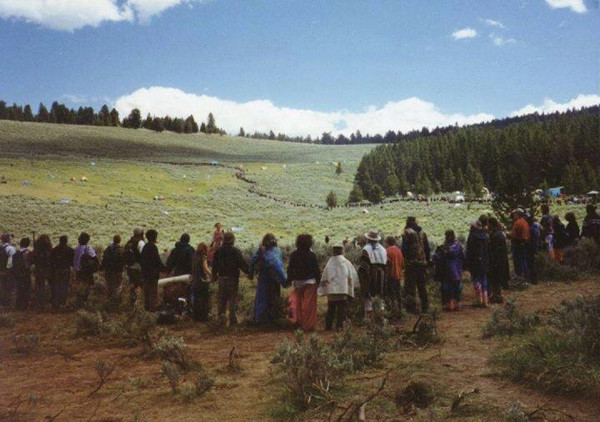
PHOTO/ROSEMARY CURTH
CHICAGO — Since 1972, annual “Rainbow Gatherings” have been held in U.S. National Forests during the first week of July, bringing together thousands of people every year in one of the most fascinating Utopian experiments in history.
The annual U.S. National Rainbow Gathering is the oldest and largest, usually attracting (according to some estimates) over 20,000 people. The movement has since spread around the world, with smaller Gatherings taking place at regional, national, and international levels.
Decisively unofficial and non-hierarchical, Rainbow Gatherings have been organized over the decades through incredible collective efforts to create temporary intentional communities where all can eat, have access to water, receive medicine, and participate in abundant music, art, yoga, meditation, prayer, educational workshops, and more.
One unofficial philosophy of “Rainbow” is to view all people as Family: to treat everyone with love, respect, and kindness. Walking in, one is greeted with the words “Welcome Home,” “Lovin’ you,” “brother,” “sister,” etc. By necessity, there is a strong ethic of collectivity through sharing resources and volunteering service.
For me, the most amazing thing about Rainbow Gatherings has been to see with my own eyes people actually doing their best to live according to the universal moral principle: “from each according to ability, to each according to need.” What’s more, to experience the abundance, love, and magic that is possible when people trust each other enough to share.
However, there are many problems facing the Rainbow Gathering community, which can be summed up by the fact that the model is unsustainable. This is primarily because it relies upon the capitalist market economy for its necessary foods, tools, and materials. Beyond this, there are a range of problems concerning the environmental footprint left by the Gatherings, such as damage to vegetation and disposal of human waste. Despite sincere efforts on the part of individuals to “leave no trace,” Rainbow Gatherings – especially larger ones – inevitably leave a tremendous impact on the land. Finally, there is the risk of bumping up against the State: Gatherings always attract a large police presence, and conflicts with law enforcement occur often and threaten to increase as police forces around the country intensify.
The Gatherings, however, continue to grow. Why? There are many reasons, as Gatherers come from all walks of life. However, one thing they generally have in common is that they are in one way or another disillusioned by the existing society – which at Rainbow Gatherings is typically referred to as “Babylon.” The growth of this ideological “New Age” movement indicates a shift in social consciousness toward questioning capitalism.
Indeed, evidence that society is in upheaval is everywhere. The key thing to understand about this is that jobs are being irreversibly eliminated by new labor-replacing technologies. As electronics drive down the value of labor, more and more working-class people are forced into economically unsustainable situations. For the first time in history, the practical necessity – rather than simply the moral imperative – for a society based on sharing has emerged.
Whether or not you believe in prophecies, a new world is being born.
Caption: At U.S. Rainbow Gatherings (such as this one in Montana in 2013), July 4th is observed with a morning of silence during which people assemble in a meadow, form a circle, and, at noon, chant “OM” as a prayer for World Peace. PHOTO / ROSEMARY CURTH
